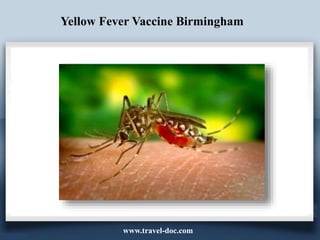Yellow Fever Vaccine Birmingham
- 1. Yellow Fever Vaccine Birmingham www.travel-doc.com
- 2. Yellow Fever is a serious viral infection thatŌĆÖs usually spread by a type of daytime biting mosquito known as the Aedes aegypti. It can be prevented with a vaccination. Yellow fever mainly occurs in sub-Saharan Africa (countries to the south of the Sahara desert), South America (especially the Amazon) and in parts of the Caribbean. Yellow fever can be fatal. About 8% of people who get yellow fever die from it. www.travel-doc.com
- 3. Yellow Fever Vaccination Luckily, there is a very effective vaccination for yellow fever. Some countries require proof of vaccination (a certificate) against yellow fever before they let you enter the country. Vaccination is the single most effective way of preventing yellow fever. In the UK, Stamaril (produced by Sanofi Pasteur MSD) is the only licensed yellow fever vaccine. A single dose of the yellow fever vaccine will protect against yellow fever for life. It is no longer recommended to have a booster dose every 10 years (WHO, World Health Organisation, July 2016). Ideally, you should have the yellow fever vaccination at least 10 days before your travel. This will allow enough time for your body to develop protective antibodies against the yellow fever infection. www.travel-doc.com
- 4. The Yellow Fever Vaccination is Recommended for: ’é¦ Anyone traveling to, or living in, areas or countries where yellow fever is endemic. ’é¦ Anyone traveling to a country where an International Certificate of Vaccination or Prophylaxis (ICVP) against yellow fever is required for entry. ’é¦ You must have a yellow fever vaccination at least 10 days before you travel. This will allow enough time for your body to develop protective antibodies against the yellow fever infection. www.travel-doc.com
- 5. Who should not be Vaccinated? People who should not have the yellow fever vaccination include: ’é¦ Babies under nine months of age ŌĆō babies who are six to nine months old should only be vaccinated if the risk of getting yellow fever during travel is unavoidable. ’é¦ Pregnant women ŌĆō unless the risk of yellow fever is unavoidable. ’é¦ Breastfeeding women ŌĆō unless the risk of yellow fever is unavoidable. www.travel-doc.com
- 6. ’é¦ People whose immune systems are lowered (immunosuppressed) ŌĆō such as people with HIV and those receiving chemotherapy or radiotherapy. ’é¦ People who are allergic to eggs ŌĆō the vaccine contains small amounts of egg white protein, albumin. ’é¦ People who have had a severe allergic reaction (anaphylaxis) to a previous dose of the yellow fever vaccine. ’é¦ People who are allergic to any of the ingredients in the vaccine (including eggs). www.travel-doc.com
- 7. ’é¦ People who have a condition that affects the thymus gland (part of your immune system that is located in your upper chest). ’é¦ People who are currently very unwell (such as with a high fever) ŌĆō this is to avoid confusing the diagnosis of your current illness with any side effects from the vaccine. ’é¦ Yellow fever na├»ve travellers ŌĆō those who have not been previously exposed to the vaccine who are 60 years of age or over should be individually assessed by the travel doctor or nurse. www.travel-doc.com
- 8. Side Effects of the Vaccine After having the yellow fever vaccine, 10-30% of people will have mild side effects such as: headache, muscle pain, soreness at the injection site and mild fever. Reactions at the injection site usually occur one to five days after being vaccinated, although other side effects may last for up to two weeks. An allergic reaction to the vaccine occurs in one case out of every 130,000 doses of the vaccine that are given. Yellow fever vaccine-associated neurological disease (YEL-AND) www.travel-doc.com
- 9. Rarely, the yellow fever vaccine is associated with a neurological condition known as yellow fever vaccine-associated neurological disease (YEL-AND). Neurological means that it affects the nerves and the nervous system, including the brain and spinal cord. YEL-AND occurs in around four cases out of every 1 million doses given. However, for people who are 60 years of age or over and yellow fever vaccine naïve, the incidence of YEL-AND increases to around one in every 50,000. This needs to be balanced against the risk of acquiring the disease. www.travel-doc.com
- 10. Preventing Mosquito Bites As well as getting the yellow fever vaccination before traveling, you should also take steps to avoid being bitten by mosquitoes The mosquitoes that carry yellow fever bite during daylight hours. Although it may not always be possible, you should try to: ’é¦ Avoid places where mosquitoes live, such as swamps, forests and jungles. ’é¦ Choose air-conditioned accommodation. Mosquitoes do not like air- conditioned spaces. www.travel-doc.com
- 11. ’é¦ Choose accommodation with mesh screening over the windows and doors. ’é¦ Wear loose fitting, long-sleeved tops and trousers, even in the heat of day. ’é¦ Use insect repellent containing DEET on exposed skin, such as Jungle Formula. 50% DEET is sufficient. ’é¦ Burn a mosquito coil or use a plug-in device that releases insecticide in your accommodation. ’é¦ Use a mosquito net where possible, especially in bedrooms that are not air- conditioned. www.travel-doc.com
- 12. Address: 12 The Wharf, 1st Floor , 16 Bridge Street Country: United Kingdom (Birmingham ) Phone No: 0121 2275852 Email: info@travel-doc.com Contact Us: www.travel-doc.com













